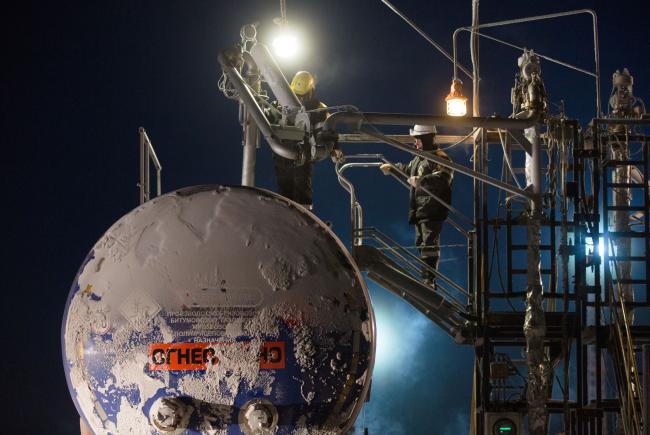(Bloomberg) -- The US and its allies have discussed trying to cap the price on Russian oil between $40 and about $60 a barrel, according to people familiar with the matter.
Allies have been exploring several ways to limit Russia’s oil revenues while minimizing the impact on their own economies in discussions that began in the run-up to the Group of Seven summit.
At the summit in Germany on June 28 leaders agreed to explore options to cap prices by banning insurance and transportation services needed to ship Russian crude and petroleum products unless the oil is purchased below an agreed price.
A more specific threshold would depend on market conditions when a cap is agreed and those could change significantly. Before Monday’s mini-rout in headline oil prices, Russian crude was probably trading around the $80-a-barrel mark. Information about transactions in the nation’s barrels has become less visible since the invasion.
The range spans from what is believed to be Russia’s marginal cost of production and the price of its oil before the Feb. 24 invasion of Ukraine, the people said. The Biden administration considers a cap of $40 to be too low, two of the people said. The aim is to cut Moscow’s revenue for its war in Ukraine but the risk is that poorly executed measures would lead to a spike in oil prices.
The Biden administration has so far steered away from deploying extra-territorial secondary sanctions to enforce restrictions imposed on Russia and such moves are usually seen with concern among some European allies. Their use alongside a price cap is likely a measure of last resort, according to one of the people.
Biden administration officials are having multiple meetings a week on the price cap now, trying to push it into reality, one official said. The effort will intensify in the coming weeks, the official said.
Spokespeople for the White House National Security Council didn’t immediately comment on the discussions.
While oil caps got a mention in the G-7 communique, there is a lot of skepticism that an agreement will be reached in the near future as the idea still needs fleshing out and there are a number of obstacles. Nevertheless, discussions are ongoing to try to nail down a concrete proposal.
One issue is that the mechanism would require the European Union to introduce exemptions to sanctions the bloc adopted at the beginning of June when it agreed to an outright ban on those services after overcoming weeks of intense negotiations between member states. EU sanctions require unanimity and the backing of all 27 member states. The UK is also poised to introduce restrictions on its insurers and service providers, one of the people familiar said.
The US is concerned that the European ban as is, which in the EU’s case begins to come into force at the end of the year, could contribute to oil prices spiking even further -- to as high as $185 a barrel according to some estimates -- and potentially could lead to a global recession, the people said.
Together with the UK, the EU covers most of the global insurance market and Russia would find it difficult to move its product without access to those services.
G-7 countries and the EU have already agreed to phase out importing Russian oil. But as they have done that, Moscow has looked to increase exports to other buyers at a discounted price. Russia is still taking more than $600 million a day from oil, even as several nations shun its supplies.
The latest data shows that China has doubled in the three months ending in May what it spends on Russian oil, gas and coal. India shelled out $5.1 billion in the same period, more than five times the value of a year ago.
To work, the US-driven idea of an oil cap would need to create enough of an incentive for countries to want to participate. Oil buyers would need access to lower prices and to the key services such as insurance that they need to transport the commodity. The threshold also needs to be set a level at which Russia would continue to export.
The US is also weighing a number of potential enforcement tools, including possible restrictions on shipping companies that transport oil at higher prices and sanctions on banks and financial institutions that facilitate sales above any agreed threshold, the people said.
©2022 Bloomberg L.P.
